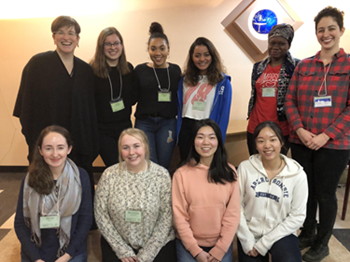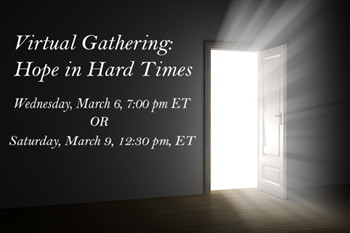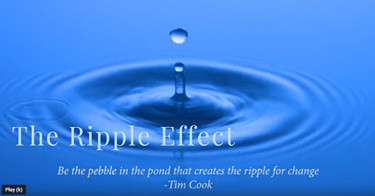CUC eNews: February 26, 2019 – Issue 79
In This Issue:
- Viola Desmond’s Placement on Ten-Dollar Bill Challenges Canadians
- Unitarian Commons Aims to Bring Cohousing to Toronto
- Kingston Unitarian Fellowship Benefits from Work Study Program
- Roundtable Seeks to Offer Hope in Hard Times
- Reminder: Delegate Registration and Orientation for the CUC AGM
- The Ripples Are Spreading
- In Memoriam
- Upcoming Events You Won’t Want to Miss
Viola Desmond’s Placement on Ten-dollar Bill Challenges Canadians to Confront Racism
By Donovan Hayden, Unitarian Fellowship of Northwest Toronto

Winnipeg Free Press
The new ten-dollar bill commemorates the life and legacy of Viola Desmond.
Commemorate is a good word, but the word celebrate is more compelling. We commemorate events and anniversaries with objects but celebration is done by people. Celebration is an expression that puts life and power into objects.
When I first heard about putting Viola Desmond on the ten-dollar bill, my initial feeling was “that’s nice”. As an American-Canadian with dual citizenship, I know both countries’ governments have broken promises to racialized communities. However, this time I was given hope: I was excited to hear the official announcement that Viola Desmond would be the face of Canada’s new ten-dollar bill. Across the country, cities were having ceremonies to mark this occurrence, including the city with the largest black population, Toronto.
On CBC, there was an interview with Nadine Williams, a black Canadian poet who presented at the ceremony. Filled with optimism, I clicked the podcast and listened, but was soon disappointed. Williams recalled the history of Viola Desmond and discussed what the dollar meant to her without explicitly mentioning Desmond’s race until halfway through the interview. Racism, let alone anti-black racism, was never mentioned.
The racism facing black Canadians is constantly ignored, thus omitting the full recognition of our experience. The omission in the interview was reinforced by further discussions I had with white Canadians about the bill, who emphasized Viola Desmond’s entrepreneurship and the fact she was the first Canadian woman on our currency. While everyone knew Viola Desmond’s placement on the ten-dollar bill was monumental, no one wanted to delve into why.
Now there are many Canadians, especially black Canadians, that acknowledged the legacy of Viola Desmond as a black person, but the discussion on the legacy of anti-black racism has been limited. When the experiences of racialized Canadians is recognized, it is sanitized and broadened so that White Canadians can understand better and will not be challenged. Viola Desmond becomes a brave and resilient entrepreneur. A true Canadian, immortalized on our money, as a symbol of overcoming adversity. But the question remains: a symbol of what?
Viola Desmond was an entrepreneur, artist, and innovator, but at that moment in the Roseland theatre she was what all black Canadians have been, a victim of racism. Viola Desmond showed the same kind of courage that many black Canadians adopt to deal with a country steeped in white supremacy. I do not wish to relegate her significance but to elevate the recognition of black Canadians.
That is why I celebrate the Desmond dollar. I celebrate our full experience as black Canadians. An experience that includes an entrepreneurial, innovative, and artistic spirit that cannot be disconnected from our resiliency in the face of oppression. I appreciate being able to look at that ten-dollar bill and see myself in it. Not simply because she shares the tint of my skin or the kink of my hair but because she endured an experience that I share.
She exemplifies the racialized experience of black Canadians and the systems perpetuated for and by white Canadians. By having Viola Desmond on our money, we are obligated to hold ourselves responsible to her legacy and rectify Canada’s racial past and present.
What does the image of Viola Desmond on the ten-dollar bill mean to us as Canadians? It means that we are relearning our own history. It means that we are beginning to recognize our own civil rights work in Canada. It means that we have a face to inspire us to do more. It means we have something to celebrate. By choosing to celebrate Viola Desmond we can find ways to engage with Canada’s racialized past and present, so that the racism that defines her legacy becomes history.
Unitarian Commons Aims to Bring Cohousing to Toronto
Seven Unitarians have a dream. They dream of bringing cohousing with a Unitarian Universalist flavour to Toronto by creating Unitarian Commons, a planned multigenerational, accessible community. Five years into the journey, member Lorna Weigand acknowledges the process has been slow, but says the group is undeterred.
“We knew it would be challenging because Ontario has very little cohousing, whereas BC has quite a lot, and we knew that other people had been shot down and weren’t able to do it, but we’re kind of determined, and we think it’s the right thing to do,” she says.
Cohousing originated in 1970s Denmark, and combines the autonomy of private living spaces with the advantages of shared resources and community living. It’s based on private ownership of complete, self-contained homes centered around shared facilities, such as a common house with children’s play spaces, adult meeting spaces, common kitchen, and other features. Many cohousing groups have smaller private units because owners are able to use the common spaces for some of their daily activities. Although each home has its own complete kitchen, members convene regularly in the common areas for meals and other social events.
Members of the Toronto group came by their interest in cohousing in different ways. For Weigand, it began growing up on a small mixed family farm near Ottawa, sharing a community with residents of about a dozen other family farms in what she came to realize later was somewhat of a co-operative lifestyle. In 2010, she picked up a magazine called “Communities – Life in Cooperative Culture”’, read about Cohousing, and as an empty nester found the concept appealing.
Four years later she and the six other Unitarians came together, deciding on the name Unitarian Commons for their project, and have been meeting monthly since then. The group has met with several developers, including the Daniels Corporation and Options for Homes, and believes it is close to choosing a location. The desired site would need to be large enough for between 20 and 40 apartments averaging 800 square feet.
Although Unitarian Commons aims to resemble existing cohousing developments in many ways, its members are also placing a special emphasis on universal design, making all of the units and common spaces accessible to residents and visitors with disabilities. The concept, however, goes beyond mere accessibility and demonstrates an underlying commitment to including as wide a range of users as possible, including those with vision, hearing or other disabilities. Housing built with universal design in mind, Weigand says, costs less than one percent more to build than conventional housing. Renovating existing buildings to make spaces universally accessible is considerably more expensive.
However, Weigand says developers are often reluctant to implement universal design because of the perceived added expense. This is why Unitarian Commons supports OWN, the Older Women’s Network in their petitioning the federal government to require any multi-unit housing built under federal jurisdiction to comply with the Universal Design concept.
“One of the problems has been that if there isn’t legislation, then they’ll try to get away with as little change as possible,” she says, “so we’re saying if you change that legislation, developers from now on have to start building in a way that everybody can access”.
Members of the group also hope to make the complex as affordable as possible, though they acknowledge that is a challenge given Toronto’s expensive real estate market. And while Unitarians will have the first crack at living in the cohousing complex, additional units will be open to everyone, since the group believes cohousing has broad appeal.
“There’s been so much written about loneliness, both in our papers and in papers in the UK,” says Weigand. “We know that living in community is a healthier way to live”.
Learn more about Unitarian Commons
Kingston Unitarian Fellowship benefits from Work Study Program
By Elena Baker
When I moved to Kingston this year to pursue my Bachelor of Education, I had hoped to get involved with the Kingston Unitarian Fellowship (KUF). I had previously belonged to a congregation in Toronto, and I wanted to find a new spiritual home. Lo and behold, I also found a great part-time job in that same congregation!
Over the past several years, the Kingston Unitarian Fellowship has partnered with Queen’s University to host Work Study students. I am one of KUF’s eight students this year, and I help with the congregation’s Religious Exploration program. The Work Study program at Queen’s allows students who demonstrate financial need to receive priority for certain part-time jobs. This program allows students to have hands-on, experiential learning opportunities while also providing an important source of income.
Many of these jobs are on-campus positions; however, Queen’s also partners with not-for-profit organizations such as KUF, and reimburses the students’ salaries.
This program has created a symbiotic relationship between the congregation and the students here at KUF. For example, Religious Education Coordinator Amy Findley says the Work Study students have helped the children’s program to grow by providing extra hands without greatly increasing the demand for volunteers. The students also provide assistance with many other aspects of the congregation, such as planning Sunday services, offering information technology support, and organizing the space.
Many universities across the country offer the Work Study program to their students. If your congregation wants to increase connections with young adults in the community, consider contacting your local university and learning about how they partner with non-profit organizations.
Rev. Beckett Coppola says the program has been well worth the effort: “It is worth exploring even though it takes energy, intention, and commitment to make the experience worthwhile and engaging for the students and the congregation. The rewards are absolutely invaluable, and can change the office culture of the congregation dramatically!”
I certainly will look back at my time at KUF as one of the highlights of my year in Kingston. I hope that other Canadian youth can benefit from this program as well.
Learn More About the Kingston Unitarian Fellowship
Roundtable Seeks to Offer Hope in Hard Times
How does one find hope in hard times? Part of the answer may lie in recognizing that feelings of discouragement today aren’t uncommon. Amidst what sometimes seems like a steady drumbeat of bad news in politics, the environment, and much else, it’s easy to feel down. Indeed, a discussion along these lines at a recent meeting of BC Unitarian ministers was what spurred Rev. Linda Thomson and Joan Carolyn, the CUC’s Congregational Life leads, to envision a roundtable on the topic.
“They were saying at times they felt people were feeling pretty overwhelmed,” says Thomson. “Out of that conversation, the idea was born”.
The roundtable, Thomson stresses, isn’t meant to be instructional. Rather, it’s a chance to share and learn from others.
“It’s not a content piece: here’s what you need to do in order to cope with existential angst,” she says. “It’s ‘what do you do and how can we support one another’”.
Although the roundtable’s facilitators are putting together a resource list of various supports, Thomson encourages participants to bring their own ideas to the session, and she hopes they will come away feeling validated and with new ideas of their own. The roundtable may become an ongoing series if there’s sufficient interest.
“Whoever’s feeling the need for some encouragement or is feeling a little lost is welcome”, she says.
Two sessions are being offered, one on March 6 and the second one on March 9.
Learn More About the Roundtables
Reminder: Delegate Registration and Orientation for the CUC AGM
Have you chosen your on-site and/or online delegates yet for the 2019 Annual General Meeting (AGM)? Please be sure to register all your delegates through the online delegate registration form by April 1.
Online delegates (those not attending in person) who have registered by April 1 will be sent instructions and links for the AGM ahead of time. On-line delegates who have not registered by April 1 will not be able to participate. Register your online voting manager by April 1. An online voting manager should be a tech-savvy person in your congregation designated to manage the online voting sheets,
On-site delegates who have been registered by your congregations are approved to vote and do not need to bring any certification from their congregations. If you have new delegates, presidents or folks in your congregations who would like to participate online, please have them attend an online orientation session (see below) and sign up for the delegates email group, if they are not already a member, by emailing info@cuc.ca with a request to join the group.
Online delegates who are not familiar with the online voting system used in previous years, or who need a refresher, are requested to attend one of three orientation sessions. At the very least, the online voting manager in your congregation needs to attend the orientation. This is required to minimize issues and to ensure the AGM runs smoothly on May 11. Once registered for an orientation session, delegates will be sent instructions for participation.
Thursday, April 4th – 4 pm PT | 5 pm MT | 6 pm CT | 7 pm ET | 8 pm AT
Saturday, April 20th – 9 am PT | 10 am MT | 11 am CT | 12 pm ET | 1 pm AT
Tuesday, April 23rd – 6 pm PT | 7 pm MT | 8 pm CT | 9 pm ET | 10 pm AT
Feedback for motions: February 28th is the last day for sending in your congregation’s feedback on the proposed motions. Find information on the motions and the AGM with details on how to provide feedback in the Motions package. Word documents for feedback are available for download.
Read More About the Upcoming AGM
The Ripples Are Spreading
Last week, we announced the launch of The Ripple Effect, the CUC’s two-year campaign focusing on water and its related environmental issues. Explore the extensive resources, for yourself and your congregation, that are available on the Ripple Effect Resources Site including information on fracking, bottled water, flooding and drought, poor drinking water, plastic in waterways, water and reconciliation, and reducing consumption. Join the Ripple Effect Facebook group and share resources you have found so they can be added.
Explore the Ripple Effect Resources Site
In Memoriam
Joan (Bunty) Albert, April 20, 1948 – February 20, 2019
Joan (Bunty) Albert lives on in our hearts with her infectious smile, glint in her eye and optimism. Bunty was a committed Unitarian and, for many years, was a mainstay of the Prince Edward Island Unitarian Fellowship. Bunty passed away on February 20, 2019, in Charlottetown, PEI, with her two children by her side.
Read the Obituary in The Guardian
Milton Stanley Orris October 10, 1932 – November 28, 2018
It is with a strong sense of gratitude that we are recognizing the special impact that Milton Stanley Orris had on the world and the people around him. Milton passed away suddenly of a heart attack on November 28, 2018, after 86 years of living life to its fullest. He briefly served on the CUC’s board in 2017.
Read the Obituary in the Globe and Mail
Join the Canadian Unitarian Council on Facebook!
Upcoming Events
Share what’s going on in your congregation. Contact communications@cuc.ca
Deadline: 14th of each previous month.
National Events
CUC 2019 Annual General Meeting (AGM), May 11 from 1:00 – 4:30 p.m. ET / 10:00 a.m. – 1:30 p.m. PT, The Atrium at Centre for Social Innovation, 192 Spadina Ave (please note change of location).
CanUUdle XIX, May 17 – 20 – Hosted by the Unitarian Church of Calgary
CanUUdle is the annual national conference for Canadian UU youth and their adult advisors. It’s a beautiful weekend where youth and adults create an amazing community, worship together, grow as spiritual beings and join in multigen activities. The theme for CanUUdle XIX is Roots and Wings! We will be diving into our identities as Unitarian Universalists.
Chorus, May 17 – 20, Edge Camp Retreat Centre, AB
Each year, Canadian UU young adults (18-35) gather to build beloved community, deepen our cross-country connections, and grow as spiritual beings. Chorus will be held at River’s Edge Camp & Retreat Centre near Calgary.
International Events
Equity in Action: Gender in an Intersecting World, April 11-13, 2019, New York City
The UU United Nations Office is excited to host this year’s Intergenerational Spring Seminar on gender equity in collaboration with the UU College of Social Justice. Programming will be interactive and intergenerational, encouraging participants to challenge their assumptions, connecting their activism with grounding in UU faith, and empowering them with the tools to bring back to their communities to make change locally and globally. Youth participation is encouraged – see the primer for youth and youth advisors to help plan for youth participation.
Youth and Young Adult
Gathered Here: Young Adult Check-In, 3-11, 4-8, 5-6, 6-10, 7-8, 8-12, 8 p.m. ET
Gathered Here is a monthly online check-in and gathering for Canadian Unitarian Universalist young adults.
Webinars
Worship as a Beacon for Congregational Growth, Saturday, March 30, 9:30 – 12:30 p.m. PT (12:30 – 3:30 p.m. ET)
Part one of two, we’ll explore ways to create meaningful worship that engages minds, hearts, and spirits. Our presenter is the Rev. Dr. Barbara Wells ten Hove.
Connecting Across the Generations, April 13, 12:30 – 2:30 p.m ET
Churches are one of the few places (outside of our own families) where we can make friends across the generations. How can we use that niche to build a sense of community, trust, connection, and care? Facilitated by Asha Philar, CUC’s Youth and Young Adult Ministry Specialist.
Photography and Video 101, April 20, 12:30 – 2:00 p.m. ET
Amber Dawn Bellemare will be covering the basic of photography and video creation in this webinar. Among other topics, Amber will address what equipment and software you need, along with providing links to get you started in editing. General guidance and suggestions will be shared to get you up and running. The presentation will be followed by a question and answer period.
Roundtables, Virtual Gatherings, and Training
THR: Reconciliation Through Film
Film: Trick or Treaty – Registration (ends March 5)
Watch the film and read the materials: March 6 – March 20
Reflection Group: Wednesday, March 20, 7-8:30 ET and Saturday, March 23, 12:30-2:00 ET
Virtual Gathering: Hope in Hard Times, Wednesday, March 6, 7:00 – 8:30 p.m. ET OR
Saturday, March 9, 12:30-2:00 p.m. ET
Arising out of common concern, voiced by religious professionals, we invite people to join in this time of reflection and sharing – looking at the ways we find Hope in Hard Times.
CRA Policy Guidance, Monday, March 11, 7:30 p.m. ET
The discussion will focus on the CRA’s draft guidance explaining the administration of changes to the Income Tax Act. The CRA is accepting comments until April 23, 2019.
THR: Reconciliation Through Film
Film: Angry Inuk – Registration: March 23 – April 10
Watch the film and read the materials: April 10 – April 24
Reflection Group: Wednesday, April 24, 7:00-8:30 p.m. ET and Saturday, April 27, 12:30-2:00 p.m. ET
Lay Chaplain Basics Training: Designing and Leading Rites of Passage, April 12- 14
Neighbourhood Unitarian Universalist Congregation. Toronto, ON
This workshop provides basic guidelines on the management of a congregation’s Lay Chaplaincy program and the training new Lay Chaplains need to begin their work.
THR: Reconciliation Through Film
Film: The Road Forward- Registration: April 27 – May 22
Watch the film and read the materials: March 6 – March 20
Reflection Group: Wednesday, June 5, 7:00-8:30 p.m. ET and Saturday, June 8, 12:30-2:00 p.m. ET

